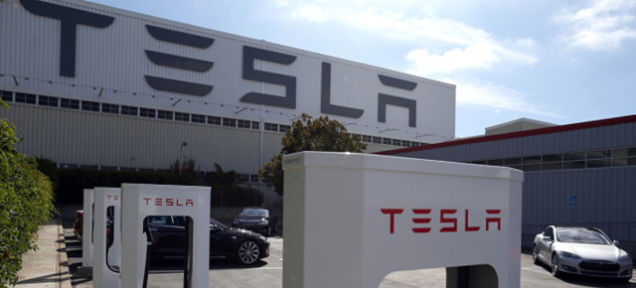Tesla is planning a so-called Gigafactory, an enormous battery plant to supply the company’s upcoming high-volume Model 3. California wants that factory bad, offering to waive its environmental regulations to win it. That’s bad news — for Tesla, for California, for you and me, and for the future of electric cars.
The offer on the table would give Tesla a pass on some of the most stringent aspects of the California Environmental Quality Act, a statewide policy that requires a detailed environmental impact report before any project can break ground. As the L.A. Times reports, Gov. Jerry Brown’s office has offered to fast-track the process for Tesla, waiving major portions of the law, and even letting the company begin construction first and mitigating any ensuing environmental damage later.
That’s a bad move in any industry. The laws should apply to everyone, especially hot new companies led by half-mad billionaires who want to have the first grave plot on Mars. It’s particularly troubling when the state offers to lift its 44-year-old environmental protection laws for a company focused on building the green, zero-emission cars of the future.
Just wade into the comment section of any article about Tesla, or electric cars in general, and you’ll see the uphill battle the zero-emission machines of tomorrow face. “If your electricity comes from coal, an electric car is just as dirty as a gas car” (false). “Those batteries will be a paperweight in 10 years” (not true). “You’ll have to pay an arm and a leg to replace them” (nope). “They can’t be recycled” (nuh-uh).
These are genuine concerns: People who haven’t done deep research (or even cursory Googling) on electric cars will naturally wonder how they stack up to the dinosaur-powered vehicles we’re used to. Whether it’s Tesla, Nissan, GM, or any other automaker, the only way to convince buyers that electric cars are viable in the market is to win on a level playing field.
That’s what’s bad about California’s offer to brush Tesla past the environmental hurdles that every other industry in the state must face. By offering a sizable leg up against the competition, California would unwittingly imply that Tesla, and electric cars in general, just can’t hack it in the current regulatory climate. Not to mention that waiving environmental laws for a company that builds green alternative vehicles is an irony that’s impossible to ignore.
It’s understandable why California would want to do this. The Gigafactory proposal holds some huge numbers: a $US5 billion facility, spanning 10 million square feet, powered by local solar and wind energy production, employing up to 6,500 workers. No governor would say “no thanks” to that.
And while California is home to both Tesla’s corporate headquarters and its sole assembly line, the Golden State is currently last among the five states in the running for the Gigafactory. Blame the high cost of land and higher wages. Reno, Nevada is the odds-on front runner right now.
But to those who oppose alternative energy, or who merely remain unconvinced as to its viability, government hand-holding looks like an admission that the tech can’t succeed on its own. Look at the backlash around solar panel company Solyndra and hybrid carmaker Fisker, two high-profile startups that flamed out magnificently despite sweetheart government support. Those failures still sting for a lot of folks. They will see Tesla dancing around regulations as another company being whisked forward in a government fast lane — and it will be hard to convince them that this time will be different.
Those of us who want more viable electric cars on the market want them to win in a fair fight. Requiring manufacturers to clear the same regulatory hurdles as everyone else helps ensure against more duds like Fisker and Solyndra.
Tesla, of course, wants to make money, and speeding up a slow environmental review process (and grabbing a sweet $US500 million in tax breaks) is a fine path toward profit. Tesla’s logic in asking for a pass, and California’s reasoning in offering it, is purely pragmatic in the short-term.
But for Tesla, image is just as important as product. The company wouldn’t build slinky luxury sedans and outrageous gullwing-door crossovers if it was trying to compete for pragmatic, Consumer Reports reading, Toyota Corolla-buying customers. With its “free to everyone” patents and pie-in-the-sky predictions for a gasoline-free future, Tesla wants to come across as the big-money corporation that buyers can trust to do the right thing. Asking the government to sweep it past the velvet rope, no questions asked, flies in the face of this image.
Electric cars are the most future-proof concept for individual transportation. Unlike hybrids, diesels, or hydrogen fuel cells, electric cars can be powered by any electricity source, whether that’s solar, wind, hydroelectric, nuclear, or old-fashioned coal. Frail though it may be, the infrastructure for charging electric cars at home is already in place. Tesla’s Model S has already won the hearts of the automotive press — largely because it stacks up so well against its more traditional competition.
As successful as Tesla has been, it still has an uphill fight in convincing lawmakers, investors, and the buying public that electric cars can be successful. Demanding, and accepting, golden-kid treatment from a state government will just provide more bullets for the anti-future crowd to fire at the technologies that could legitimately bring cars into the 21st century.
